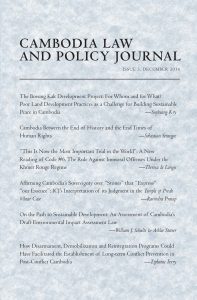BY KOK-THAY ENG
The Cambodia National Rescue Party (CNRP) should tone down its anti-Vietnamese rhetoric, while the Cambodian People’s Party (CPP) should look carefully at a long-term, anti-corruption plan for the benefit of the party. This plan should include milestones to be achieved annually.
What has been seen in the past five years and longer is that corruption has been allowed to continue in a subtle, more sophisticated and widespread way. The judicial system is another key area that the CPP must look at and address for its long-term success. Cambodian people at the grassroots level must deal with issues of justice on a daily basis. If corruption is allowed to continue unabated, then more people will become dissatisfied with the CPP in this and future elections, especially while the CNRP is making inroads into rural areas and will prop up more able candidates.
However, it is important to note that over the past 10 years the CPP has helped bring Cambodia a higher level of prosperity, peace and more jobs, while adeptly handling the conflict with Thailand.
On the other hand, the CNRP’s anti-Vietnamese position has come to a point where it is dangerous for harmonious coexistence between Cambodia’s various ethnic groups. Usually it takes only racist words from one group to ignite deeper hatred between opposing ethnic groups. This could lead to much larger and more dangerous tensions. Inter-ethnic tensions and conflicts usually result in very violent conflicts. We should remember that during the Khmer Republic period, thousands of innocent Vietnamese ethnics were brutally killed without trial and deported without proper compensation.
In my study of the history of global genocide, racist attitude is the key early component for such tragedies to happen. Genocide can start from those who propose wholesale anti-ethnic policies or those who consider themselves to be future victims of anti-ethnic violence, thus taking pre-emptive actions.
What I see the CNRP’s position to be now is that the party is leading its members, intentionally and unintentionally, toward a much broader hatred toward Vietnamese ethnic groups who they never define carefully. Some people estimate the number of Vietnamese immigrants in Cambodia to be 100,000, others from between 750,000 to 900,000, while a small group of people estimate it to be about 4 million, which would account for nearly 30 per cent of the entire Cambodian population. The larger number is usually advocated by members of the CNRP.
The large number is very dangerous because it includes people in the grey zone between Vietnamese ethnic groups and other ethnic groups where intermarriage and community interaction exist, making it difficult to classify ethnicity. The CNRP’s argument of large numbers of ethnic Vietnamese runs against itself because the larger the Vietnamese population, the more votes they lose.
In addition, the CNRP’s comparison of the CPP with the Khmer Rouge is more absurd than true. Although land grabbing and evictions are a rampant problem in Cambodia now, it does not give the CNRP the rights to liken the CPP to the Khmer Rouge. Although the current ruling members of the CPP are former members of the Khmer Rouge, one should view them more as conscientious citizens willing to join a revolution to tackle corruption and inequality existing during 1960s and the Khmer Republic period and the usurpation of power by an inept Lon Nol and Sirik Matak over the legitimate and popular ruler Prince Norodom Sihanouk. Under Democratic Kampuchea, there is a difference between those bent on widespread killing and those who happened to be members of the revolution but had nothing to do with the evacuation plan and later brutality. Plus top members of the CPP were those who joined the Vietnamese forces to stop the Khmer Rouge genocide, and they never continued the genocide under their own rule.
By eliminating racist rhetoric and streamlining some of its policies, the CNRP has the potential to become a sanctuary for Cambodians who become disenchanted with the ruling party.
About the Author
Kok-Thay Eng, PhD, is the deputy/research director at the Documentation Center of Cambodia.

